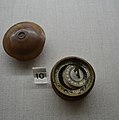David Beringer (1756 – 1821) was a German scientific instrument maker and craftsman. Different sources report his place of birth as either Dieppe[1] or Nuremberg.[2] In either case, he was recorded as living in the Lorenzseite neighborhood of Nuremberg in 1798,[2] and in Augsburg around 1776.[3][4]
David Beringer | |
|---|---|
| Born | January 12, 1756 |
| Died | October 28, 1821 (aged 65) |
| Occupation(s) | Scientific instrument maker and craftsman |
| Spouse | Anna Ottilia Hofmann (married 1777) |
Admitted as a master craftsman in 1777, the same year as his marriage to Anna Ottillia Hofmann,[2] Beringer is known for building cubic wooden sundials, most of which bore two signatures: his own and that of G.P. Seyfried, an associate presumably affiliated with one of the local guilds, which Beringer does not appear to have joined.[5]
Beringer died as the result of an accident in 1821.[2]
- Examples of Beringer's work
-
Orologio solare, xvi-xvii sec. 01
-
Portable diptych sundial MET 188801
-
Cuadrante solar (Siglo XVIII). Museo Naval de Madrid.
Wikimedia Commons has media related to David Beringer.
References
edit- ^ "Museo Galileo - David Beringer". catalogo.museogalileo.it. Retrieved 2019-06-14.
- ^ a b c d "Collections - National Maritime Museum". collections.rmg.co.uk. Retrieved 2019-06-14.
- ^ "Horizontal String-Gnomon Dial, by David Beringer, Augsburg, 1776 (MHS Record Details: IRN 2896, Inventory number 40334)". Museum of the History of Science. Retrieved 2019-06-14.
- ^ Michel, Henri (1967). Instruments des sciences dans l'art et l'histoire. Viking Press. p. 161.
- ^ Pizzamiglio, Pier Luigi. Orologi solari da usare e da leggere: rassegna degli scritti e degli strumenti di gnomonica conservati nella Biblioteca" Carlo Viganò" e nella Collezione" Alberto Viganò". La scuola, 2004. p112
External links
edit- "Museo Galileo - object description". Retrieved 2024-07-10.


